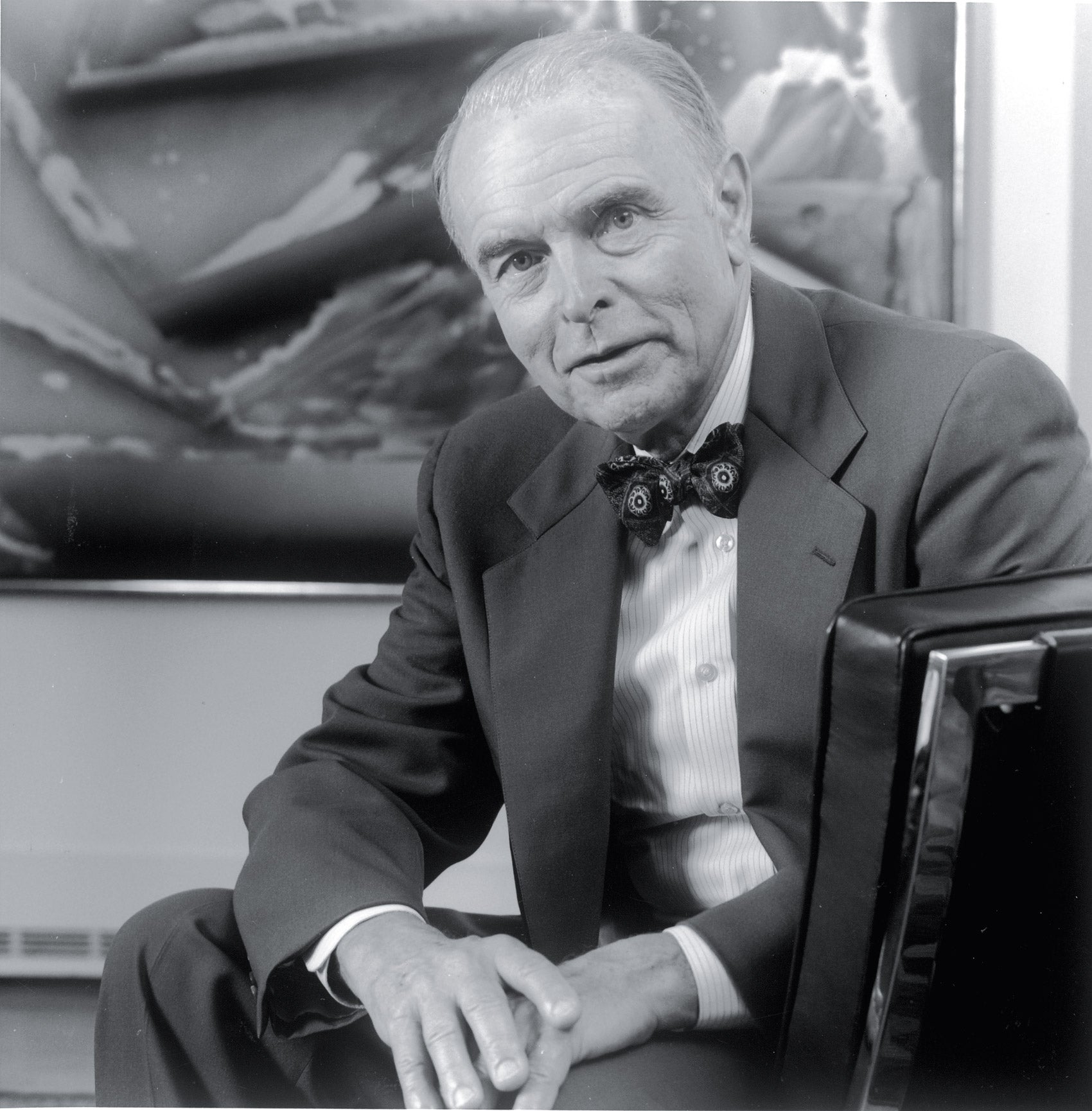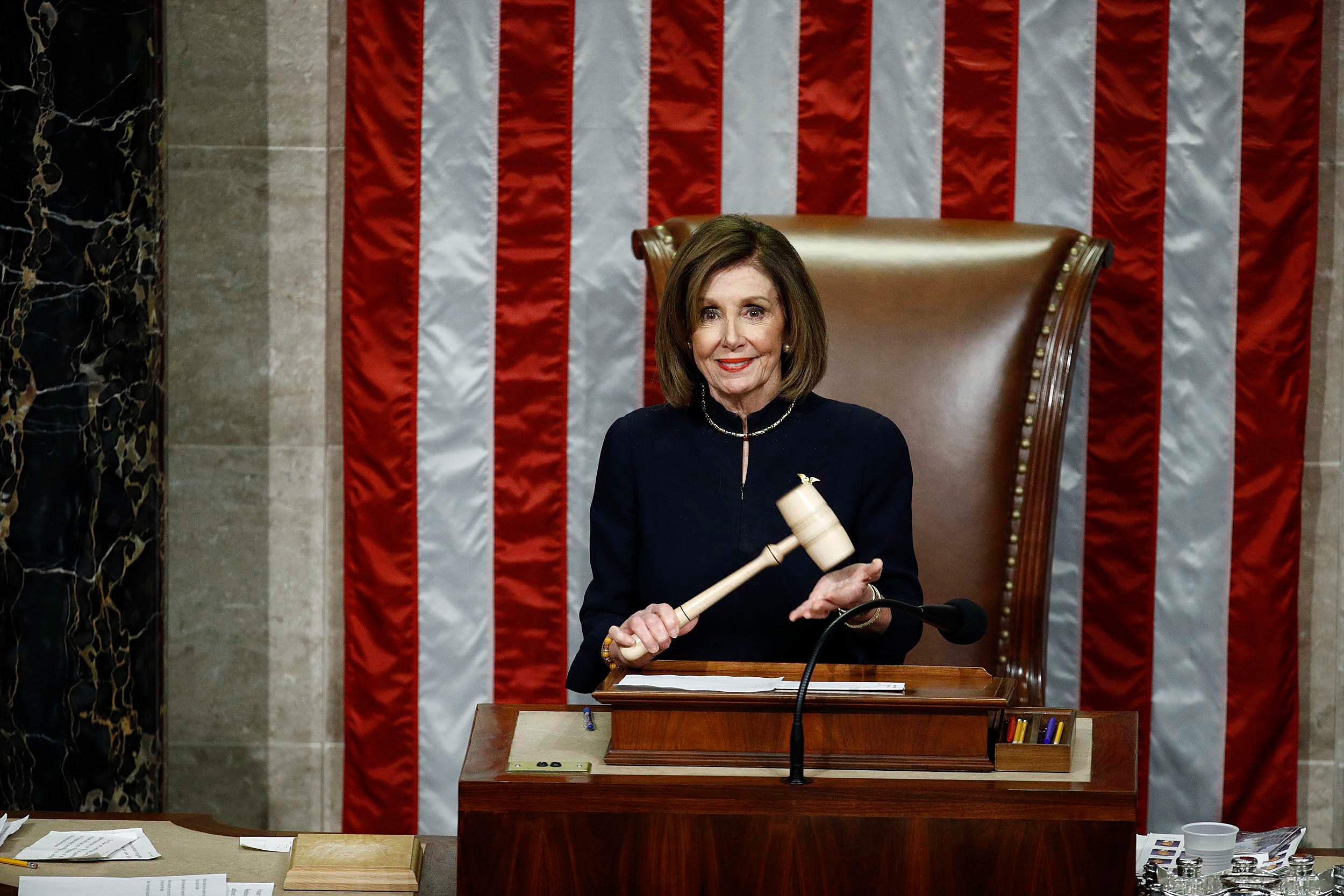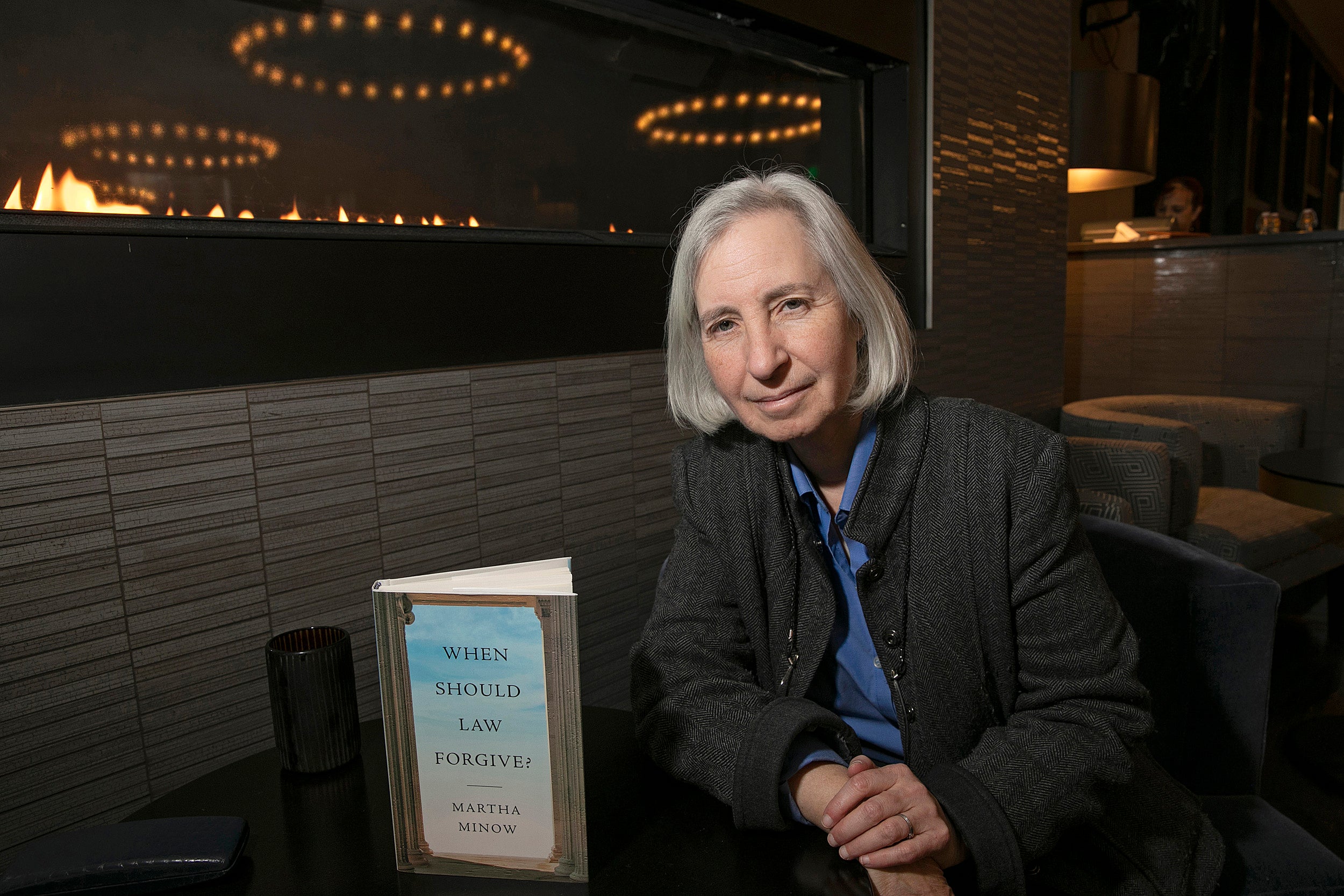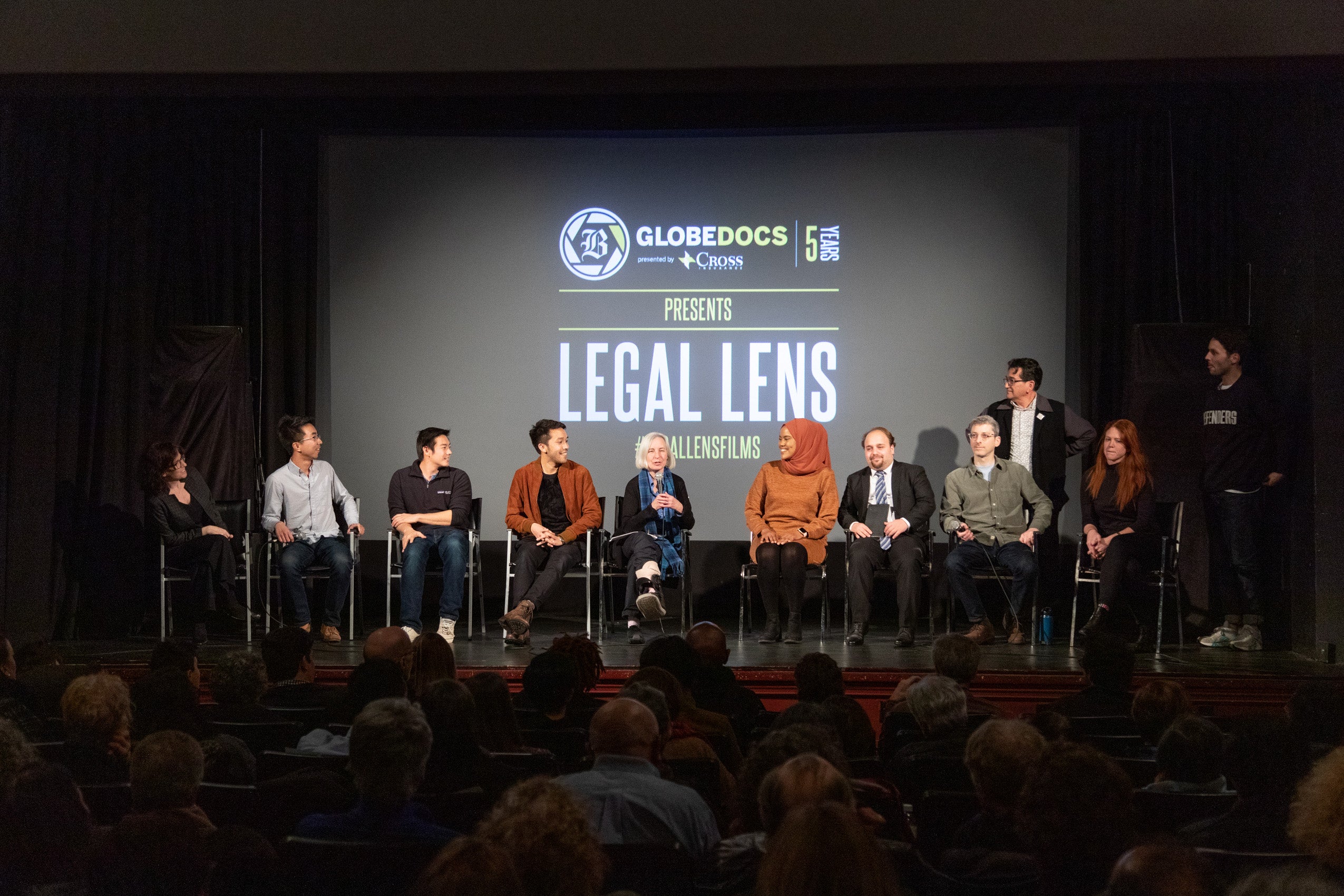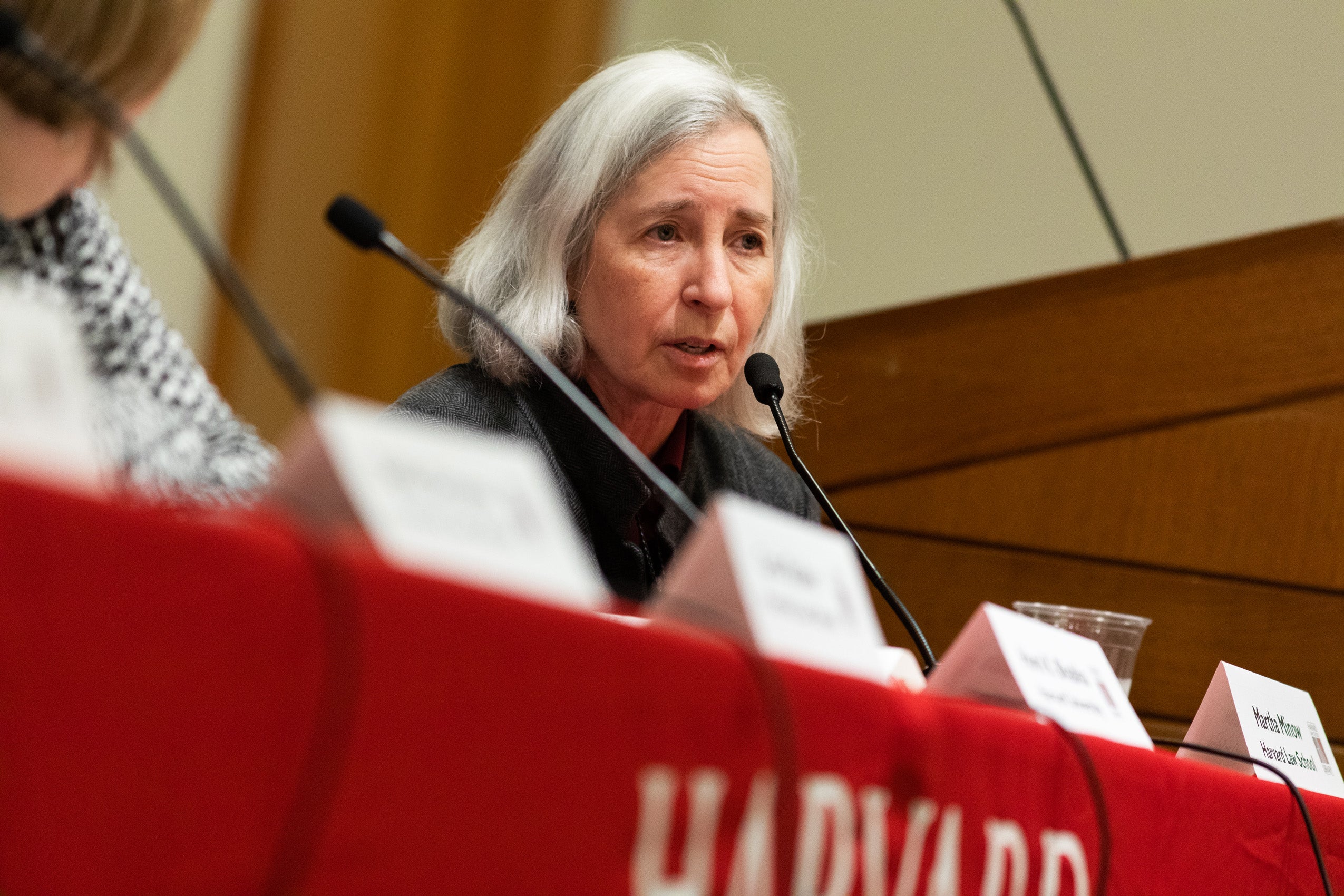People
Martha Minow
-
Barr’s Justice Department Is Ignoring The Lessons Of History
February 13, 2020
An op-ed by Martha Minow: Why have four federal prosecutors withdrawn from the case they successfully pursued against Roger Stone, and why does it matter? The four were “career lawyers” at the U.S. Department of Justice; they pursued criminal charges against Roger Stone, a friend and advisor of President Donald Trump, and their case produced a conviction on seven counts, including witness tampering and lying to investigators following Stone’s work for Trump's 2016 presidential campaign. Pursuing usual procedures, they requested a sentence of seven to nine years, which ordinarily would then be left to the judge for a decision. But then, President Trump — apparently in response to strong lobbying through the media and perhaps behind closed doors — took to Twitter and called the situation “a miscarriage of justice.” His tweet actually said “cannot allow this miscarriage of justice.” Leaders at the Department of Justice submitted a revised request for a lower sentence — and the White House maintained it had nothing to do with the change...Without public confidence in the integrity of investigations and prosecutions, respect for the criminal process, convictions and the rules themselves can crumble.
-
John ‘Jack’ Cogan Jr. ’52 (1926-2020)
January 29, 2020
John F. Cogan, Jr. ’52, a legal leader, civic activist and dedicated supporter of Harvard Law School, has died. He was 93.
-
Letting Go
January 7, 2020
"Ours is an unforgiving age, an age of resentment," writes Martha Minow in "When Should Law Forgive?," a compassionate yet clear-eyed reexamination of law’s basic aims.
-
How social media has destroyed our ability to forgive
December 23, 2019
The holidays can be emotionally taxing for many people, but especially so for Sarah Montana. It’s been more than a decade since her brother and mother were murdered in her childhood home in Dale City, VA...Montana, who was 21 at the time of the murders, says she’s forgiven Pinckney. She hasn’t said it to his face — he’s serving a life sentence in a Virginia prison with no possibility of parole — but she’s sent him a letter...Forgiveness has never been less fashionable, particularly in this era of social media, when people score points for being nasty to each other. “Forgiveness often requires proximity,” says Martha Minow, a Harvard law professor and author of the recently released book “When Should Law Forgive?” The lack of eye contact in digital media, along with the disinhibition effect, makes it easier to choose rage over forgiving. “It takes time and patience to forgive someone,” she says. “You have to actually listen and hear the apology and decide if it’s trustworthy. You can’t do that online.” Montana agrees that it’s more difficult to forgive in the culture of fear that’s only encouraged online.
-
Martha Minow On When The Legal System Should Forgive
December 20, 2019
America incarcerates people at a higher rate than any other nation in the world. In "When Should Law Forgive?," 300th Anniversary University Professor and former Harvard Law School dean Martha Minow analyzes the tools of forgiveness that are already built into our criminal justice system, and how they could be better utilized to create a more restorative society. On Boston Public Radio on Thursday, Minow said forgiveness in the context of law means "letting go of justified grievances" to focus less on revenge and more on repairing harm. "The focus is forward-looking rather than retrospective," she said. "The focus is actually restoring some sense of peace and developing some norms within the community where people actually participate, not just one-on-one, but as a collective on how do we prevent conflict and how do we actually build a stronger community."
-
Minow, Gordon-Reed probe what impeachment means and where it leads
December 19, 2019
To gain a better understanding of the issues in play following the House impeachment of President Donald Trump, the Harvard Gazette asked faculty and affiliates in history, law, politics, government, psychology, and media to offer their thoughts.
-
Martha Minow on the power of forgiveness
December 12, 2019
The Harvard Gazette recently sat down with Martha Minow, the 300th Anniversary University Professor and former dean of Harvard Law School, to talk about her book new book, "When Should Law Forgive?," and why she thinks forgiveness could make the law more just.
-
On the Bookshelf: HLS Authors
December 11, 2019
This fall, the Harvard Law School Library hosted a series of book talks by Harvard Law School authors on topics ranging from forgiveness in law, transparency in health and fidelity in constitutional practice.
-
Focus on Justice
November 25, 2019
At a packed Brattle Theatre last week, five short films created by 12 Harvard Law students from eight countries debuted. The documentaries, ranging across topics from gentrification to climate change, are the results of an innovative January term workshop taught by Martha Minow, former Harvard Law dean and 300th Anniversary University Professor.
-
Martha Minow on Forgiveness in the US Legal System
November 25, 2019
Harvard Law School Professor and former Dean Martha Minow has taught generations of lawyers – including former President Obama – about the power of the law and how a sentence can best match a crime. She sits down with Michel to discuss how the American legal system, whose rate of incarceration is the highest in the world, could use a little compassion.
-
Harvard Explores Slavery Connections Further
November 22, 2019
President Lawrence S. Bacow emailed the community on November 21 to announce an “initiative on Harvard and the legacy of slavery,” backed by an initial $5 million in funding and overseen by a faculty committee led by Radcliffe Institute dean Tomiko Brown-Nagin, Paul professor of constitutional law and professor of history. ... Joining Brown-Nagin and Beckert on the presidential committee are: Annette Gordon-Reed, Warren professor of American legal history and professor of history; ... Martha Minow, 300thAnniversary University Professor (former Law School dean);
-
Legal Lens project
November 18, 2019
Law and documentary film may seem far apart, but they actually share many connections. Documentary filmmakers confront legal questions about privacy, secrecy, access to public and private spaces, and ownership of images and other materials. With the guidance of filmmaker and producer Joseph Tovares and support from the Hewlett Foundation, 12 Harvard Law School students from eight countries have worked since January on the Legal Lens project, producing the five short films hosted here.
-
The Laws of Forgiveness
November 18, 2019
In her new book, “When Should Law Forgive?,” the lawyer and academic Martha Minow looks at several areas where she believes American society has become too punitive and offers ways to fix them. Minow is interested in why some societies have found it easier than others to grant forgiveness to wrongdoers; she is also captivated by how and why certain societies have been able to put into place policies that minimize crime and misbehavior, which in turn help us understand that bad behavior is the result of more than individual choice. As she writes, “Child soldiers and other adolescents accused of criminal law violations may not be entirely innocent, but neither are they responsible for the social conditions in which they make their choices. The same can be said of individuals who are drowning in consumer debt or student loans, and even of sovereign nations, cities, and states in debt. Each is to blame when they violate promises to pay back loans or laws against violence, but each also is embedded in larger social patterns that construct limited and often poor options.”
-
A legal lens on home
November 18, 2019
An op-ed by Martha Minow: Public knowledge about law is vital in the same way that public engagement with politics and society matters. Liberty and democracy depend on informed and motivated communities. Yet crucial questions involving law are too often inaccessible to nonlawyers. Lawyers tend to spend little time educating anyone other than their clients, or other lawyers when they act as judges and administrators. Lawyers also deploy technical words and seldom know how to produce the visual media so effective in shaping public knowledge. For these reasons, I decided to offer a course on documentary filmmaking for students at Harvard Law School. Law and documentary film may seem far apart, but they actually share many connections. Documentary filmmakers confront legal questions about privacy, secrecy, access to public and private spaces, and ownership of images and other materials. Lawyers increasingly use video interviews and computer-generated graphics in hearings and negotiations. Mass media culture informs views of legal decision-makers and everyone’s pictures of courts and law.
-
Why we need a more forgiving legal system
November 15, 2019
The American justice system’s approach to crime seems to be: Lock up as many people as possible. This is one of many reasons why we’re the most incarcerated country in the world. Punishment has a role in any criminal justice process, but what if it was balanced with a desire to forgive? What if, instead of locking up as many people as possible, we prioritized letting go of grievances in order to create a better future for victims and perpetrators? ... A new book by Harvard law professor Martha Minow, titled When Should Law Forgive?, explores how the restorative justice philosophy might be scaled up and applied to the broader criminal justice system. Minow was dean of Harvard Law from 2009 to 2017 and is known for her work on constitutional law and human rights, especially the rights of racial and religious minorities... I spoke to Minow about what that change might look like, whether it’s compatible with the American philosophy of justice, and why some people have reservations about abandoning the status quo.
-
Forgiveness in an age of ‘justified resentments’
November 8, 2019
Dehlia Umunna remembered seeing the fear. “His eyes were dark,” Umunna recalled. “And he was close to tears. And he looked at me and said, ‘Will I be going to jail and will I be going to jail for a very long time?’” “He was shaking,” she said. “I looked over at his mom and his mom was shaking. She was nervous. She was holding the hands of her 13-year-old boy.” Umunna, a clinical professor of law at Harvard Law School and deputy director of the Criminal Justice Institute, subsequently learned that the boy, who suffered from bipolar disorder and ADHD, had been surreptitiously videotaped playing video games in his living room wearing only his underwear. By the time he arrived at school the next day, the video had been posted online, where it had been seen by 300 of his peers, who proceeded to tease him. Frustrated and angry, he was heard to say, “I understand why the Parkland shooter did what he did.” ...“And as I looked over the case, I said to myself, this is exactly what [Prof.] Martha [Minow]’s book talks about,” she recalled. “This is a prime example of where we should nudge the courts and the decision-makers to exercise forgiveness.”...Umunna’s comments came during a panel discussion of “When Should Law Forgive?”, a new book by Martha Minow, 300th Anniversary University Professor and former dean of HLS. The book explores the complicated intersection of the law, justice, and forgiveness, asking whether the law should encourage people to forgive, and when courts, public officials, and specific laws should forgive. In addition to Umunna and Minow, panelists included Carol Steiker ’86, the Henry J. Friendly Professor of Law and co-director of the Criminal Justice Policy Program; Toby Merrill ’11, an HLS lecturer on law and director of the Project on Predatory Student Lending; and Homi K. Bhabha
-
Forgiveness in an age of ‘justified resentments’
November 6, 2019
At a recent Harvard Law School Library book event, Martha Minow and panelists discussed her recent release, "When Should Law Forgive?", which explores the complicated intersection of the law, justice, and forgiveness.
-
‘I forgive you’ may prove to be the most just thing we can do
November 6, 2019
An op-ed by Martha Minow: Last month, after Dallas police officer Amber Guyger was sentenced to 10 years in the murder of Botham Jean, the victim’s brother, Brandt Jean, walked across the courtroom, hugged Guyger, and said, “I forgive you.” I joined others around the country, watching in awe at that act of grace. But I also worried. I worried that black people, like Jean, are expected to forgive in ways others are not. Maybe Guyger, a white police officer, received a lesser sentence than others convicted of murder. And yet I also worry that law itself is so severely weighted toward punishment that it is part of the problem. Legal officials fail to exercise tools of forgiveness built right into the law — and as a result, I worry the rest of us replicate societal inequalities, undermining justice and decency. Forgiveness — letting go of justified grievances — is supported by every religious and philosophical tradition, as well as by numerous health studies. Forgiving those who wronged us can actually improve our health. As President Nelson Mandela, who led South Africa’s transition from Apartheid to a democracy, once said, “Resentment is like drinking poison and hoping it will kill your enemies.”
-
After two years of struggling to pass any of his community college classes, Jamarria Hall, 19, knows this for certain: His high school did not prepare him. The four years he spent at Detroit’s Osborn High School were “a big waste of time,” he said, recalling 11th and 12th grade English classes where students were taught from materials labeled for third or fourth graders, and where long-term substitutes showed movies instead of teaching. What’s less certain, however, is whether Hall's education in Detroit’s long-troubled school district was so awful, so insufficient, that it violated his constitutional rights. That’s the question now before a federal appeals court that heard arguments last week in one of two cases that experts say could have sweeping implications for schools across the country...Martha Minow, a former dean of Harvard law school and the author of a book about the legacy of the landmark Brown v. Board of Education decision, said the education system in Michigan violates the Constitution because some school districts in the state fail to provide even a minimal education while others, including those in affluent suburbs of Detroit, are providing a much higher quality education. “Some people are getting an education and other people are not, and that’s discrimination,” said Minow, who filed an amicus brief on behalf of the Detroit students.
-
Forgive, but Don’t Forget…and don’t always forgive
October 18, 2019
THE FIRST PERSON President Donald Trump pardoned, in August 2017, was Sheriff Joe Arpaio. He was infamous for being brutal to undocumented immigrants and others in his shameful jails, and cheered on by neo-Nazis. The month before, a federal judge had found Arpaio guilty of criminal contempt, which carried a jail sentence of up to six months, for “flagrant disregard” of a court order. He had refused to stop harassing and arresting Latinos without any basis for suspicion that they had committed a crime. In the 2016 elections, Arpaio lost his race for a seventh term in Maricopa County, Arizona, apparently because the county no longer wanted a sheriff who engaged in what the Justice Department called “unconstitutional policing.” But in the presidential election, Arpaio helped push the county and the state for Trump, who advanced his own anti-immigrant crusade by saying Arpaio was in legal trouble for doing his job—rounding up people who were in America illegally. In When Should Law Forgive?, 300th Anniversary University Professor and former Harvard Law School dean Martha Minow reckons with a list of ways the pardon was wrong: it rewarded a crucial campaign supporter; it signaled to current and former Trump aides that they should refuse to testify against the president—and, if they were convicted, the president would pardon them, too; it went to a man known for his racist ranting and haughty defiance of law; and it reveled in that defiance. As a result, Minow emphasized, that pardon was and “is a direct invitation for disobedience.” Appalling as Arpaio’s contempt was, Trump’s was even worse as an abuse of constitutional authority: “to pardon a law enforcement official who so thoroughly disdained the law is to excuse or honor that attitude of disrespect for law and for the courts.” Minow’s book is full of similarly sharp answers to the hard question of its title.
-
Law and forgiveness in a Texas courtroom
October 4, 2019
In a new book, a former dean of Harvard Law School, Martha Minow, opens with this observation on today’s society: “Ours is an unforgiving age, an age of resentment. The supply of forgiveness is deficient.” She wrote the book – “When Should Law Forgive?” – because of what she sees as the limits of the law in dealing with the worst of crimes, such as murder, as well as the difficulty in forgiving crimes “that defy conception.” The book is well timed. On Wednesday in a Dallas County courthouse, a TV camera caught yet another public example of a unilateral act of personal forgiveness to an individual who had committed a heinous crime.
